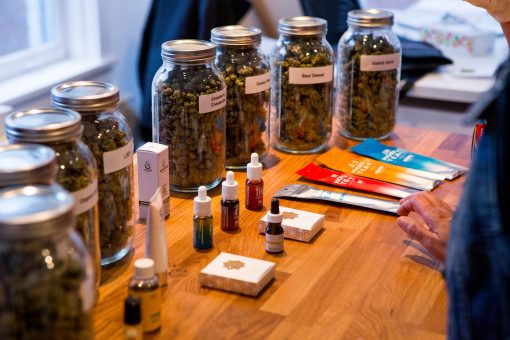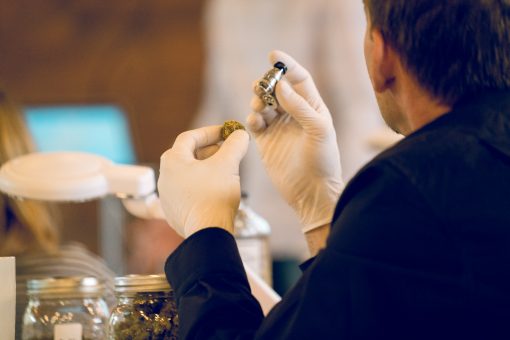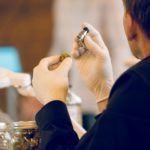
What type of skills does an experienced Cannabis Sommelier have to offer and where are these types of professionals most needed?
We explore these questions at depth in our new series Being a Cannabis Sommelier, where we discuss the real world problems that experienced Cannabis Sommeliers can help solve.
In today’s article, our Headmaster Adolfo Gonzalez discusses a troubling trend in today’s market that finds its solution in the practice of detail oriented product appreciation and community building.
Typicity. More cannabis companies need to understand what this word means and why it is so important when bringing any cultivar to market.
Typicity is a term that cannabis sommeliers borrowed from the world of wine to describe the extent to which a particular cultivar accurately reflects its known characteristics based on its claimed origins.
In other words, if you are growing DJ Short’s Blueberry, your end product should reek of blueberries. And we do mean reek. There is nothing ‘kinda blueberry’ about a well-selected Blueberry pheno.
When growers source seed stock, they cannot simply germinate their seeds and expect to get an exact replica of the mother plant that produced them because the offspring from a single seedline can show a range of varying traits.
Phenotype refers to the physical characteristics displayed by a specific plant, as triggered through the interaction between the plant’s environment and its genetic code.
Hence, a pheno hunt is aimed at selecting the offspring that bears the most desirable traits.
There is just one problem.
Selecting a high-quality and accurate version of any classic cultivar requires intimate knowledge of how that particular cultivar should look and smell according to the expectations of discerning customers who are already familiar with it.

This type of first-hand knowledge is inescapably essential for anyone trying to locate and/or develop a worthy representative of a classic cultivar.
But how many companies will have the wisdom to hire people who actually understand the typical attributes of a classic cultivar at its optimal expression?
The answer is, obviously not too many, as we can see by the many bland and boring offerings that still make up the bulk of the market.
All-time favorites like Blueberry, Exodus Cheese, and old school Skunk—all of which we are personally obsessed with—are nowhere to be seen in most legal markets or are the result of uninspired genetic sourcing, phenotype selection and production methods.
Even some of the hottest new-school cultivars that are released into the market quickly fizzle out because producers do not understand the quality standards and characteristics that are needed to impress discerning consumers.
And keep in mind that irrevocably, hot names draw attention.
There is no quicker way to sink a brand than by drawing attention to a poorly executed product. Hype can quickly turn to hurt in this world.
The launch of DNA Genetics’ classics like Kosher Kush by Tweed is perhaps one of the best real-world examples of good genetics gone wrong due to poor production expertise and a complete disregard for typicity.
Our industry chronically underestimates the process required to effectively launch genetics that already have an established name and following.
At the center of every business model in this industry is the plant itself, but few understand how to build their business around the cultivars that they represent.
Companies like Cookies are only now starting to show the legal industry what everyone in the illicit sector already knew: It’s what comes out of the jar that makes or breaks you—not marketing!
Building cannabis brands around high quality in-house genetics is actively proving to be ever more successful than the vague and plainly empty ‘lifestyle’ branding that most classically trained marketers have been pitching.
The type of expertise needed to understand quality and typicity at a high level is essential in all aspects of brand building, but nowhere is it as important as when deciding what to grow because without the right plant at the foundation, it is impossible to reach excellence.
Becoming a Cannabis Sommelier starts with specialized training in developing the nose, eyes, and touch to identify quality cannabis.

Training in typicity takes us to the next level as it is the accumulation of personal experience and vast exposure to various cultivars.
CannaReps teaches the methods needed to systematically determine typicity not only through the practice of repeatedly studying cultivars, but also through community building.
No one person could ever taste everything that the market has to offer because by the time you would have completed this arduous task there would be hundreds of new cultivars to taste!
Twice a month, CannaReps graduates from all over the world gather to discuss the cultivars that have gained popularity in their region, their typical features and we break down why they are so loved by consumers and growers alike.
In end, becoming a bonafide expert means dedication and working within a community of like-minded people that lift each other up.
Get your Cannabis Sommelier Certificate from the oldest and most respected cannabis training organization in BC, Canada. Build your skillset and join our community of hundreds of weed geeks from around the world! Sign up at www.cannabissommelier.com today.
MORE FROM THE BLOG





WAIVER & RELEASE (the “Release”)
This event is conducted by CannaReps Consulting Ltd. (“CannaReps or Company”). Please read and submit below.
I am an attendee at an event hosted by CannaReps (the “Workshop“). I release CannaReps from any and all liability, claims, demands, actions and causes of action whatsoever arising out of or related to any loss, damage or injury, including death, that may be sustained by me while participating in the Workshop.
I understand and agree that:
CONFIDENTIALITY
Any confidential or proprietary information or material relating to the Company’s operations or business which I obtain from the Company or its officers, employees, agents, suppliers or customers or otherwise by virtue of my participation with the Company or by the Company’s predecessor. Confidential or proprietary information or material includes, without limitation, the following types of information or material, both existing and contemplated, regarding the Company or its parent, affiliated or subsidiary companies: corporate information, including contractual licensing arrangements, plans, strategies, tactic, policies, resolutions, patents, trademarks, printed or digitized materials, handouts and brochures. Including any marketing information including sales, investment and product plans, customer lists, strategies, methods, customers, prospects and market research data. Including trade secrets; technical information, including drawings, designs, personal information (the “Confidential Information”).
I understand that the copyright and proprietary interest of any material provided to me belongs to CannaReps. All shared experiences from the Workshop are to remain confidential and private. I agree not to disclose any of the information learned during the Workshop outside of the Workshop except with others who attend the Workshop. I will not use any audio or video recording equipment during the Workshop, unless CannaReps approves of the recording and filming by providing prior written consent. I understand that any audio or video recording made during the Workshop is the property of CannaReps. I will not use CannaReps’ information for business or commercial purposes, without first obtaining the prior written consent of CannaReps.
INTELLECTUAL PROPERTY
I understand, acknowledge and agree that all copyright, trademarks, trade secrets, intellectual property rights, and any other rights arising from any designs, and all of the work products and materials conceived, developed or created by the CannaReps and any rights ancillary thereto (collectively, “Intellectual Property Rights”) which were solely or jointly with others, conceives, designs, creates, derives, develops or makes in the course of or in connection with the work with CannaReps shall belong solely to CannaReps. If you haven’t already, you shall promptly disclose to CannaReps in writing any and all Intellectual Property Rights, conceived, created, derived, developed or made in the course of or otherwise in connection with my participation with CannaReps, whether alone or with others, and whether during work shop hours or through the use of facilities and properties of CannaReps.
INDEMNITY
I agrees to indemnify and hold harmless CannaReps, its officers and directors, employees and its affiliates and their respective successors and assigns and each other person, if any, who controls any thereof, against any loss, liability, claim, damage and expense whatsoever (including, but not limited to, any and all expenses whatsoever reasonably incurred in investigating, preparing or defending against any litigation commenced or threatened or any claim whatsoever) arising out of or based upon any false representation or warranty or breach or failure by me to comply with any covenant or agreement made by me herein or in any other document furnished by me to any of the foregoing in connection with this transaction.
CONSENT
Notwithstanding the immediately preceding paragraph, I consent to and grant CannaReps, the Workshop, and its assignees, the right to photograph and record me, my name, voice, appearance and likeness and other material furnished by me for use on trusted online media which include, but are not limited to, their website and social media pages. My hereby release said matter in perpetuity to CannaReps without prejudice and acknowledge that this consent is freely given without expecting compensation.
By submitting my email address below, I agree to receive electronic communication from CannaReps including personal course information, news, updates and promotions regarding CannaReps’ products. I understand that I can withdraw my consent at any time.
PRIVACY POLICY
Protecting your privacy is important to CannaReps. This Privacy Policy (“Privacy Policy”) set outs the ways in which we use your information and how we ensure its protection.
CannaReps will only collect personal information (“Information”) that will allow us to provide, enhance, market or improve our events and services. Information is collected by means of registration for any CannaReps sponsored event or service. Information collected may include name, age, gender, address, email address, payment information, and geographical information.
CannaReps may share Information. CannaReps retains the right to share Information and other statistics with our partners, prospective advertisers, and other third parties for the purposes of improving, protecting, enhancing, and promoting our events and services. CannaReps may also disclose information to our affiliates, agents, contractors, and service providers in order to facilitate the functioning and maintenance of our events and services. We will not sell any information to advertisers or other third parties.
This Privacy Policy only covers the treatment of Information and other non-identifiable information gathered by CannaReps. This Privacy Policy does not apply to the practices of any third-party services. CannaReps does not take responsibility for the content or privacy policies of any third parties. CannaReps recommends that you review the privacy policies of any third-party service providers or events you access, use, or register for through our events or services.
This Privacy Policy has been established to help you understand our commitment to protecting your privacy. CannaReps reserves the right, at any time, to change or replace any portion of our Privacy Policy. You will be notified of any changes, if we believe, they materially impact your experience at our events or services. Continued use of our services after any change to the Private Policy constitutes an acceptance of those changes.
By submitting this Release and providing Information during the registration process, including the Exhibitor’s Agreement, you consent to the collection and use of your Information for these purposes.
If you have any questions or concerns please email us at info@cannareps.ca.